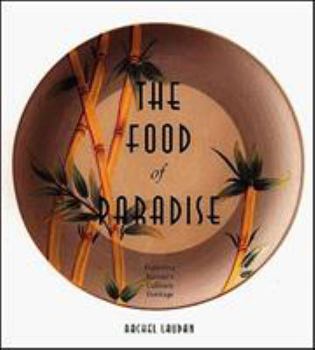The Food of Paradise: Exploring Hawaii's Culinary Heritage
Select Format
Select Condition 
Book Overview
Recent winner of a prestigious award from the Julia Child Cookbook Awards, presented by the International Association of Culinary Professionals. Lauden was given the 1997 Jane Grigson Award, presented to the book that, more than any other entered in the competition, exemplifies distinguished scholarship.
Format:Paperback
Language:English
ISBN:0824817788
ISBN13:9780824817787
Release Date:August 1996
Publisher:University of Hawaii Press
Length:304 Pages
Weight:0.30 lbs.
Dimensions:0.6" x 8.1" x 9.2"
Customer Reviews
5 ratings
If it's paradise, it must be the food of the gods
Published by Thriftbooks.com User , 15 years ago
Rachel Laudan has written a hymn to the plate lunch, a rhapsody on the theme of two scoop rice. The presses are running hot with glossy books about Pacific Rim cuisine. Laudan says she has nothing against it, but she is interested in local food. The recipes that conclude each of the essays in this book include such fare as Okinawan pig's foot soup. You will not find anything with lilikoi-Maui onion-ginger salsa on top. (Lilikoi is the local term for passion fruit.) For someone who had been in the islands only eight years (as a teacher of history of science at the University of Hawaii), she really knows her local grinds (but grinds, surprisingly, is not used anywhere in this book). For Laudan, food is not just a way of keeping the body fueled. The way people east, their tendency to avoid strange foods, their willingness to make great efforts to maintain culinary traditions in new settings tell a big story. In Hawaii, they tell a story of a creation of a successful multiethnic, multicultural society. She doesn't go as far as the historian Gavan Daws, who says, correctly, that Hawaii is the most successful multiethnic society on Earth, but she does note that in the islands, half of marriages are across ethnic or cultural boundaries. Crossing food boundaries is just as significant, in her view. Local food is a meaningful development, the offspring of "a culinary Babel." "There are few places in the world," writes Laudan, "where the creation of a cuisine is so transparently visible." Well, yes, if you look, and this is where "The Food of Paradise" excels. I have at least a couple hundred Hawaiian cookbooks (only a fraction of the published total), but all of them together don't provide as much food for thought as Laudan's one volume. While admirably thorough, she does stop short of of the extremes of local food -- neither milk guts nor finger Jell-O is mentioned. One thing she has done is to compare different editions of local cookbooks. The changes in the recipes are revealing. Take poke. (Pronounced po-kay, from a Hawaiian word, usually taken to be the word for slice, although this is controversial.) It is so common that surely it has been around forever, but Laudan says not. It seems to have been created around 1970, a typical (for Hawaii) melding of themes from several sources -- the main ones Hawaiian and Japanese, with minor notes from America and other parts of Asia. The result is pure local Hawaiian. (Poke is simply cubed raw fish, preferably ahi tuna, with minimal flavoring of onion or scallion or seaweed and possibly salt or shoyu; but since this book was published it has become a contest to devise the most unexpected combinations. There have also long been versions of cooked seafood, notably baby octopus.) Local food, as an identifiable cuisine, "began to appear in the 1920s and 1930s," writes Laudan. She has done her homework, interviewing food preparers and vendors at what she calls Open Markets. This is very much a Honolulu b
NOT a recipe book - excellent historical work
Published by Thriftbooks.com User , 16 years ago
Professor Laudan, who is primarilly a philosopher of the history of science, has produced an outstanding book on the origins and background to Polynesian food. It is not supposed to be a recipe book, and Heaven knows what the reviewer who talks about "sherbert" was on about. That was not a review. It is well-written, engrossing and in beautiful English, a real rarity nowadays. Richly deserved to win the Julia Childs Award for America. I gather that Professor Laudan's long-awaited magnum opus, the World History of Food, will be ready soon. Should be excellent and ground-breaking.
An outstanding historical perspective on Hawai`i's foods.
Published by Thriftbooks.com User , 25 years ago
Read this book before or after you visit Hawai`i, and you'll increase your appreciation of the people, the place and the food. As one born and raised here and of mixed ancestry, I treasure this book. The only significant group the author missed is the Puerto Ricans, and consequently some of the Afro-Carribean influences in our cuisine.
Wonderful Food History
Published by Thriftbooks.com User , 26 years ago
This book is not just thoroughly researched, but is very entertainingly written. For those of us who have been eating Local Food for years, but never really inquiring why we love it so, here is the unraveling of many a mystery. Our love of rice can be seen as a triumph of climate and culture, but the entire crack seed phenomenon is also excellently explored by an adventurous and appreciative non-Local. Thank you, Rachel Laudan, for opening up our history and unique culinary explorations.
Much more than a cookbook!
Published by Thriftbooks.com User , 26 years ago
Ms. Laudan did a terrific job on this book. It's an informative and enjoyable read. I more fully appreciate the rich diversity of the foods of Hawaii..




